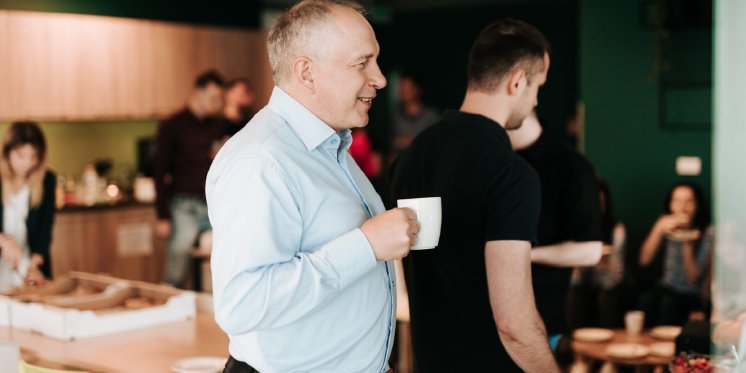Wioleta Patkowska (HR Manager): Could you tell me how it all started?
Paweł Midoń (CEO): It started in the year when the first iPhone was released. It’s good that I didn’t know what I know now: how much the world of IT and technology would change. I thought I could create a company that would give customers and employees something exceptional: something they really needed. Today I know it’s called User Experience.
But let’s start at the beginning. While working as an IT consultant, I noticed that:
- Customers expect a real understanding of their needs. They do not want to be put in the standard table (compartmentalisation).
- Clients do not want to work with a consultant from Company X, but with a person who has a name, surname, face, and competences: somebody the clients can trust.
Speaking of employees: I wanted them to feel important, listened to, and equal, and I wanted them to have the possibility to make mistakes. I wanted them to be full members of the teams, treated in the same way regardless of the country.
HR: How did you want to implement this plan?
CEO: Since I knew what the client wanted, I was able to offer a solution (sometimes taking the business risk myself), I expected their consent to act. In previous workplaces I had some limitations, for example I had situations where I felt we should do something non-standard or show the client the value first, even for free, and I heard: “it doesn’t pay off”.
I also wanted to create truly open communication: a place for discussion, criticism and risk.
HR: Why were you so sure you would succeed?
CEO: I knew it wasn’t about the corporate scale. I was convinced I could create something better, with different approach to the client and employees, and it would be appreciated (by both parties).
HR: Have you made it?
CEO: We have created one of the largest IT systems for health insurance in Europe; more people than the whole population of Poland use it. We have implemented IT projects in dozens of countries. I can say with complete confidence that we have made it!
Imagine this: the client’s CEO, and our clients are the largest European insurance companies, is calling me to say that they had never seen such commitment the project yet. It’s a great feeling and fuel for motivation.
HR: How did the company develop?
CEO: The beginnings were very demanding. During the first three months I worked round the clock, days and nights, I kept all the company documents in my laptop bag. Until one day, on Christmas Eve, I came home, got a 40-degree fever and was ill for over a week. This probably shows that it was not easy.
Our first three years were very good. It was a great time for a new product, a good time for an individual approach to the employee and the client.
However, it was not always rosy. I have had a big crisis, then I have learnt a lot. I think it was the best and most expensive training of my life. It is not hard to be a manager when the economy booms and everything works out. Even the best people experience failures and then you have to prove yourself, not be afraid to make unpopular decisions. The crisis has taught me that you have to be open and tell the truth: there is no need to lie. Transparency and good preparation for tough times are the basis of working with clients and employees.
HR: What’s next?
CEO: It’s strange, but lately I have felt like I’m at the beginning of my adventure. When I observe how rapidly the technology is changing, how COVID has changed the way we work, and the demand for our product, as health is important to people all over the world, I know there are a lot of opportunities. People will invest in health and the entire health market will invest in digitization and patient service. What I do gives me a lot of fun, and thanks to ConVista investment I can create a new plan. We want to play in the premier league.
HR: What would you tell the people who are in the same place you were 15 years ago?
CEO:
1. Start if you truly believe in success and have a plan, then work towards your goal. No hesitation. It will be harder than you think anyway.
2. Do business with people who are different from you. You will have conflicts and disagreements and different approaches, but it has to be like this. If everyone agrees with you it’s a warning sign: something is going wrong.
3. Remember that you always meet everyone twice in your life. Part with people in such a way that they will want to meet you again.
Author: Paweł Midoń
CEO CONVISTA HEALTH; MEMBER OF THE EXECUTIVE BOARD AT CONVISTA
Follow us!
www.linkedin.com/company/convistapoland
Blog | Convista



